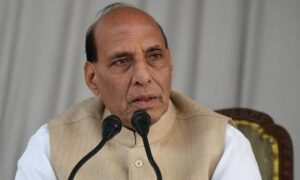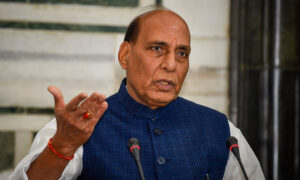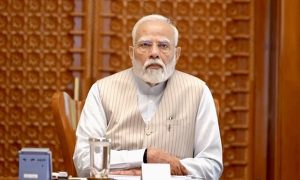In the midst of the border dispute with China, defence minister Rajnath Singh on Thursday said that India was determined to protect its sovereignty and territorial integrity in the face of unilateralism and aggression, no matter what the sacrifice. His comments come on the eve of the eight round of military talks between the two countries to reduce friction in the sensitive eastern Ladakh theatre.
Singh said India is a peace-loving country but has been facing challenges on its borders.
“We believe that differences should not become disputes. We attach importance to the peaceful resolution of differences through dialogue. We respect various agreements and protocols that India has entered into for peace and tranquility on our borders,” Singh said, during a speech to mark the diamond jubilee of the National Defence College.
The next round of corps-commander-level talks will be held along the contested Line of Actual Control (LAC) in the Chushul sector on Friday. Indian and Chinese military commanders met for the seventh time on October 12 in an attempt to defuse border tensions.
The Indian side demanded comprehensive disengagement at all flashpoints and restoration of status quo ante of early April during the talks. The two sides agreed to continue with the dialogue process to arrive at a mutually acceptable solution for early disengagement in the eastern Ladakh theatre. The eight round of talks will be led for the first time by the new commander of the Leh-based 14 Corps, Lieutenant General PGK Menon.
Both armies are prepared for a long haul in the Ladakh sector and are likely to hold forward positions along the LAC through the harsh winter months.
The latest round of military talks comes at a time when China is closely tracking the Malabar exercise, kicked off by the navies of India, United States, Japan and Australia in the Bay of Bengal on Tuesday amid Chinese sabre-rattling in the Indo-Pacific region.
The 24th edition of the Malabar exercise is being held in two phases — the first phase in the Bay of Bengal from November 3 to 6 and the second phase in the Arabian Sea in mid-November.
China has been wary of the Quadrilateral security dialogue or Quad that was revived in late 2017 by India, the US, Australia and Japan, and these suspicions have increased since the four countries upgraded the forum to the ministerial level last year.
On Pakistan, the defence minister said the neighbour remains adamant in the use of terrorism as state policy. “However, we have achieved substantial success in working with progressive and like-minded countries to not only expose Pakistan’s regressive policies but also make it increasingly difficult to continue with its previous business as usual approach,” Singh said.
By Hindustan Times




























 WhatsApp us
WhatsApp us